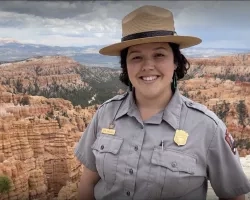John “JT” Reager is receiving the Presidential Early Career Award for Scientists and Engineers (PECASE) for his groundbreaking analysis of the way water moves around the globe. The PECASE Award is the highest honor given by the U.S. government to early-career government scientists and engineers who demonstrate the capacity for innovative science and cutting edge exploration.

Photo Credit: JT Reager
Reager's research uses gravity to track water above and below Earth’s surface. The data comes from two identical NASA spacecraft that make up the Gravity Recovery and Climate Experiment (GRACE).
Reager found that when there are weather patterns like El Niño, there is often an increase in how much water is pulled from the ocean and dumped on land. This extra water, which arrives as rain or snow, doesn’t immediately cycle back to the ocean via rivers and watersheds. Reager says that, instead, the land absorbs so much incoming water that it slowed the rate of global sea level rise in the last decade by about 0.7 millimeter per year. But Reager is quick to note that this slowing of global sea level rise is only temporary.
“Hydrology patterns like this aren’t permanent,” Reager cautioned. “Over the next 10 years, drought could allow that water balance to shift back toward the ocean, compounded by melting glaciers and rising global temperatures.”
The fact that sea level rise could accelerate in coming years is important information for coastal communities, the military and city planners who need to account for changing coastlines and rising tides.
Reager is based at NASA’s Jet Propulsion Laboratory (JPL); is part of the GRACE Follow On (GRACE-FO) mission, Soil Moisture Active Passive (SMAP) and Sea Level Change science teams; and works with the Applied Sciences Water Resources program. He is also the Deputy Project Applications Lead for the GRACE-FO mission. His work may be innovative, but he wasn’t expecting this award. “I didn’t even know I was nominated – it wasn’t until I started getting calls for interviews that I knew it had happened,” Reager said.
Reager's current managers in NASA's Earth Science Division and his former JPL group supervisor Jay Famiglietti nominated him for the Presidential Award. Famiglietti, now a professor at University of Saskatchewan, said, “I could not be more proud of JT. He’s a deep thinker who has done really outstanding early career work. I am so excited that he is getting important recognition for his accomplishments. I think that we can expect to see JT continue his brilliant research trajectory as his career progresses.”
Reager and 313 other recipients of the PECASE award will receive the honors at a ceremony at Constitution Hall in Washington, D.C. on July 25, 2019.


